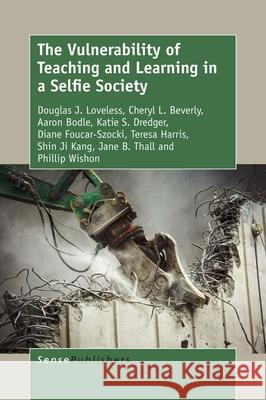The Vulnerability of Teaching and Learning in a Selfie Society » książka
The Vulnerability of Teaching and Learning in a Selfie Society
ISBN-13: 9789463008105 / Angielski / Miękka / 2016 / 160 str.
The Vulnerability of Teaching and Learning in a Selfie Society
ISBN-13: 9789463008105 / Angielski / Miękka / 2016 / 160 str.
(netto: 178,07 VAT: 5%)
Najniższa cena z 30 dni: 179,73
ok. 22 dni roboczych.
Darmowa dostawa!
This book explores the generative power of vulnerabilities facing individuals who inhabit educational spaces. We argue that vulnerability can be an asset in developing understandings of others, and in interrogating the self. Explorations of vulnerability offer a path to building empathy and creating engaged generosity within a community of dissensus. This kind of self-examination is essential in a selfie society in which democratic participation often devolves into neoliberal silos of discourse and marginalization of others who look, think, and believe differently. By vulnerability we mean the experiences that have the potential to compromise our livelihood, beliefs, values, emotional and mental states, sense of self-worth, and positioning within the Habermasian system/lifeworld as teachers and learners. We can refer to this as microvulnerability--that is, those things humans encounter in daily life that make us aware of the illusion of control. The selfie becomes an analogy for the posturing of a particular self that reinforces how one hopes to be understood by others. What are the vulnerabilities teachers and learners face? And how can we joker, as Norris calls it, the various vulnerabilities that we inherently bring into teaching and learning spaces? In light of the divisive discourses around the politics of Ferguson, Charlie Hebdo, ISIS, Ebola, Surveillance, and Immigration; vulnerability offers an entry way into exhuming the humanity necessary for a participatory democracy that is often hijacked by a selfie mentality.
This book explores the generative power of vulnerabilities facing individuals who inhabit educational spaces. We argue that vulnerability can be an asset in developing understandings of others, and in interrogating the self. Explorations of vulnerability offer a path to building empathy and creating engaged generosity within a community of dissensus. This kind of self-examination is essential in a selfie society in which democratic participation often devolves into neoliberal silos of discourse and marginalization of others who look, think, and believe differently.By vulnerability we mean the experiences that have the potential to compromise our livelihood, beliefs, values, emotional and mental states, sense of self-worth, and positioning within the Habermasian system/lifeworld as teachers and learners. We can refer to this as microvulnerability—that is, those things humans encounter in daily life that make us aware of the illusion of control. The selfie becomes an analogy for the posturing of a particular











